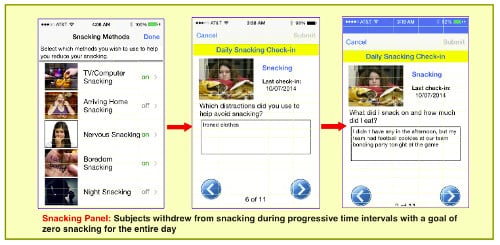On happiness scales, obese patients have rated their quality of life as being similar to that of cancer patients on chemotherapy. So why don’t they just stop overeating? Because overeating is not really the cause of their obesity, but rather the symptom of an underlying problem. What for simplicity’s sake we call “food addiction” is really overeating addiction, which is a hybrid of sensory and behavioral addictions. Certain foods tend to cater to one or the other of those two components.
Sensory addiction is sparked by high-pleasure, or “feel good,” food, which can ease negative emotions, which are stressful. The brain likes anything that can relieve stress. The behavioral addiction manifests more in excessive food amounts, and holds sway in nervous eating, with its repetitive mechanical action of bringing the hand to the mouth. Biting, chewing, and swallowing are all part of the allure, and of course those are also sensory experiences.
Sugar and Fat: A Dangerous Pairing
Researchers Adam Drewnowski and Eva Almiron-Roig wrote about the palatability or hedonic quality of food:
Sensory processes begin with the placement of food in the mouth, the fracturing of the food by the teeth and its dilution with saliva, oral perception of temperature and texture, and the binding of taste and flavor molecules to receptors in the oral and nasal cavities… A particular hedonic synergy is obtained by pairing sugar and fat.
They go into great detail about how fat, in particular, is received and perceived. It is the source of the smooth creaminess and moist tenderness that make some comfort foods so irresistible, but that’s not all—a different cooking method can make fat crispy and crunchy.
There is a point when sweetness becomes too sweet, especially for adults, though children don’t seem to mind. The point where sweetness turns to “yuck” is called the hedonic breakpoint. Fat does not seem to have a hedonic breakpoint, so combining it with sugar very effectively promotes overeating.
Successfully Treating Obesity—At Home
The interesting thing is, even if no one agrees that obesity results from overeating addiction, it can still be addressed with the methods that have succeeded in addiction treatment. Because we have to eat, abstinence is not the answer. We can’t quit food, but we can quit snacking, grazing, second helpings, and other bad habits that pile on the pounds.
Dr. Pretlow points out that only two existing programs really help with overeating addiction. One successful program is Energy Up, the other is Overeaters Anonymous. A majority—70 percent—of OA participants have reported losing weight by doing the work the program asks of them.
Residential immersion programs are the best, and they depend on forced food withdrawal combined with cognitive behavioral therapy. This is great for the very small percentage of people who can afford it. But how can medical professionals best replicate such programs in the everyday environment at an affordable cost? This question has been answered by the development of the W8Loss2Go smartphone app, which brings immersion program techniques into the reach of a person living normal life at home.
Learn more about these concepts by watching and listening to Dr. Pretlow’s new presentation, “Obesity Treatment Using the Addiction Model,” which recently debuted at the Obesity Summit in London, or taking a look at the relevant poster (a section of which is shown on this page).
Your responses and feedback are welcome!
Source: “Chapter 11 Human Perceptions and Preferences for Fat-Rich Foods,” NIH.gov, undated
Image: Weigh2Rock


 FAQs and Media Requests:
FAQs and Media Requests: 











